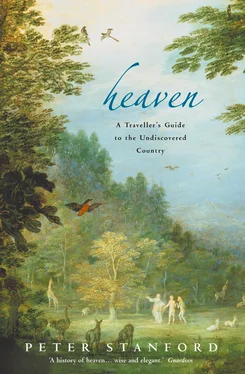Even they offer you a chance to gain understanding, as long as you remain vigilant and alert. A few days after death, there suddenly emerges a subtle illusory dream-body also known as the ‘mental body’. It is impregnated with the after-effects of your past desires, endowed with all sense-faculties, and has the power of unimpeded motion. It can go through rocks, hills, boulders and walls, and in an instant it can traverse any distance. Even after the physical sense-organs are dissolved, sights, sounds, smells, tastes and touches will be perceived, and ideas will be formed. These are the result of energy still residing in the six kinds of consciousness, the after-effects of what you did with your body and mind in the past. But you must know that all you perceive is a mere vision, a mere illusion, and does not reflect any really existing objects.
( Buddhist Scriptures , translated by Edward Conze)
This is followed by visions, by being confronted by a deity with the ‘shining mirror’ of karma, and by the dawning of ‘the six places of rebirth’. Setting out, dazed and desirous on a walk across deserts of burning sands, tormented by beasts who are half human, half animal and by hurricanes, you head for a place of refuge.
Everywhere around you, you will see animals and humans in the act of sexual intercourse. You envy them, and the sight attracts you. If your karmic coefficients destine you to become a male, you feel attracted to females and you hate the males you see. If you are destined to become a female, you will feel love for the males and hatred for the females you see. Do not go near the couples you see, do not try to interpose yourself between them, do not try to take the place of one of them. The feeling which you would then experience would make you faint away, just at the moment when egg and sperm are about to unite. And afterwards you will find that you have been conceived as a human being or as an animal.
The Tibetan Book of the Dead symbolises the penultimate one of the five alternative explanations of what happens after death. Complete oblivion was to be posited later, with the advance of science and reason, and so, long before the birth of Christianity, a choice of four beliefs existed with a shadowy afterlife in the earliest civilisations; immortality of the soul as preached by the Greeks; resurrection of body and soul, increasingly popular within Judaism; and reincarnation, the evolution to a higher form of life in this life and the constant cycle of death and rebirth found in most Eastern traditions.
CHAPTER THREE But Not Life as We Know it
There is a school of thought which claims Jesus was an Essene, and that he is the ‘righteous teacher’ referred to in the Dead Sea Scrolls. However, the case remains unproven and is scorned by many eminent religious historians. What is true is that in Jesus’ pronouncements on heaven and afterlife recorded in the Gospels, he shows more than a touch of Essene influence. Generally, early Christian ideas about heaven broadly mirror the contemplative Essenes in that they are little concerned with the fate of Israel, or indeed with anything to do with this world, being almost exclusively focused on a personal experience of the divine be it compensation for whatever ills have befallen individuals in their earthly lives, or, more simply, anticipation of the promised all-consuming experience in death which will wipe out all that has gone before.
Christianity distanced itself from its Jewish inheritance, in that heaven was seen as being exclusively with God in the hereafter, with no ongoing ties to this world. Gradually, over the centuries, the new religion moved to rejecting the idea of a heaven on earth. God’s kingdom, as far as Christianity was concerned, was elsewhere. The Gospels and epistles offer little by way of brochure details for those contemplating travel to this faraway heaven. In this they mirror their Jewish roots. What they do say is confused, woolly and sometimes downright contradictory. No iconic picture emerges. You take your pick of the options on offer – as indeed Christians have done ever after.
The New Testament gives the overall impression of regarding this particular aspect of eternal life as of little more than academic importance. Certainly there are few echoes of the detail-encrusted dreams of Enoch. Yet at the same time, Jesus and his followers operated within a society where the popularity of inter-testamental literature demonstrates a healthy appetite for speculation about what life after death would be like. The Gospels report that Jesus was occasionally drawn into debates about the nature of heaven. Even in these, though, there is a vagueness, especially around the use of the phrases ‘the kingdom of God’ and ‘the kingdom of heaven’. While the former carries with it the sense of an alternative to secular and prevailing attitudes, and hence could exist on earth, it is also often used interchangeably with ‘the kingdom of heaven’ as a description of a better and separate place ruled over by God.
The confusion seems to revolve around two issues – first fudging the Jewish idea of a renewed earth under direct rule by God so as to embrace it in an all-inclusive picture of heaven; and second the fervent expectation of the second coming and how the early Christians dealt with the disappointment of those hopes. In Mark’s Gospel, written supposedly by St Peter’s interpreter and dated around AD 64, Jesus refers continually to the kingdom of God rather than of heaven. Yet fifteen years later, in Matthew’s writing, when there still had been no second coming and the leaders of the fledgling Christian community were starting to scratch around for ways of explaining this away, there is a higher incidence of the expression ‘the kingdom of heaven’. It postponed the day when Christianity’s claims would be put to a public test.
In both Matthew and Mark there is an account of a discussion Jesus had with a group of Sadducees about the potential fate of a much-married widow in heaven. However, Luke’s later account, said to be written around the same time as Matthew, is the fullest and most intriguing:
Some Sadducees – those who say that there is no resurrection – approached him [Jesus] and they put this question to him, ‘Master, we have it from Moses in writing that if a man’s married brother dies childless, the man must marry the widow to raise up children for his brother. Well then, there were seven brothers; the first, having married a wife, died childless. The second and then the third married the widow. And the same with all seven, they died leaving no children. Finally the woman herself died. Now, at the resurrection, to which of them will she be wife since she had been married to all seven?’
Jesus replied, ‘The children of this world take wives and husbands, but those who are judged worthy of a place in the other world and in the resurrection from the dead do not marry because they can no longer die, for they are the same as angels, and being children of the resurrection they are sons of God. And Moses himself implies that the dead rise again, in the passage about the bush where he calls the Lord the God of Abraham, the God of Isaac and the God of Jacob. Now he is God, not of the dead, but of the living; for to him all men are in fact alive.’ (Luke 20:27–38)
By rejecting the Sadducees’ question – which was clearly a carefully baited trap – Jesus directly questioned a whole barrowload of Jewish notions about the afterlife. If the hereafter has no place for the recreation of earthly relationships, then the time-honoured link with ancestors (implicit in the command to raise your dead brother’s children and much treasured by the Sadducees) is of no importance. Moreover, the breaking of that bond only serves to emphasise Jesus’ description of heaven as somewhere entirely other – not of this world, not concerned with this world, and certainly not a recreation, however cleaned up and diamond-clad; the standard view of the apocalyptic writers. In effect he was saying, yes, there was life after death, but not life as we know it.
Читать дальше












